Legislative Roundtable held in Connecticut to discuss FGC
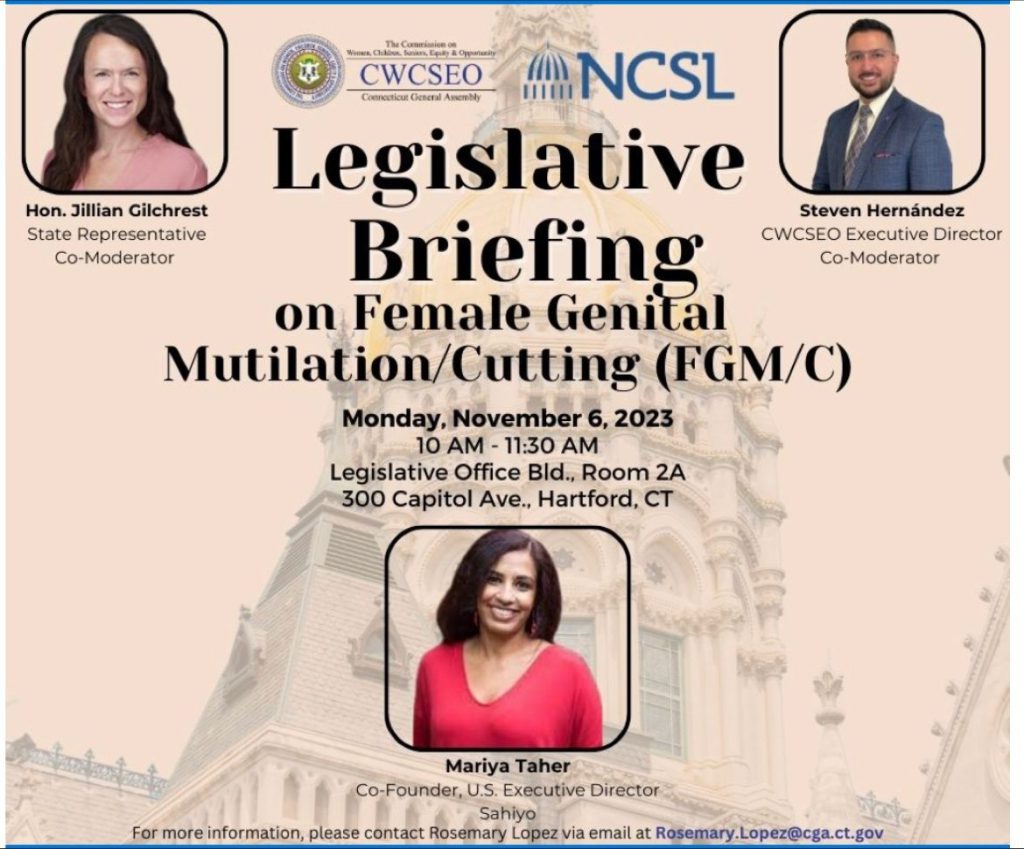
On November 6th, Sahiyo, as part of the Connecticut Coalition to End FGM/C, supported a legislative briefing on the topic of female genital cutting (FGC) hosted by the Commission on Women, Children, Seniors, Equity and Opportunity (CWCSEO) and Connecticut Representative Jillian Gilchrest. Special guests included Mariya Taher, Co-Founder and U.S. Executive Director of Sahiyo, as well as experts from the National Conference of State Legislatures (NCSL). Connecticut remains one of only 9 states in the U.S. yet to address this human rights violation in any manner; this briefing provided insights into the legislative landscape surrounding FGC in the U.S., as well as progress made, challenges faced, and how to move forward in addressing FGC. NCSL also summarized the laws addressing FGC in the 41 states. The Connecticut Coalition to End FGM/C will continue to advocate for a bill to be introduced into this next legislative cycle, starting in January 2024, in hopes that CT legislation will recognize the need to promote a safer, healthier future for all in the state. Learn more about Sahiyo’s policy work here.
My experience at the Global Woman Awards and Walk to End FGM
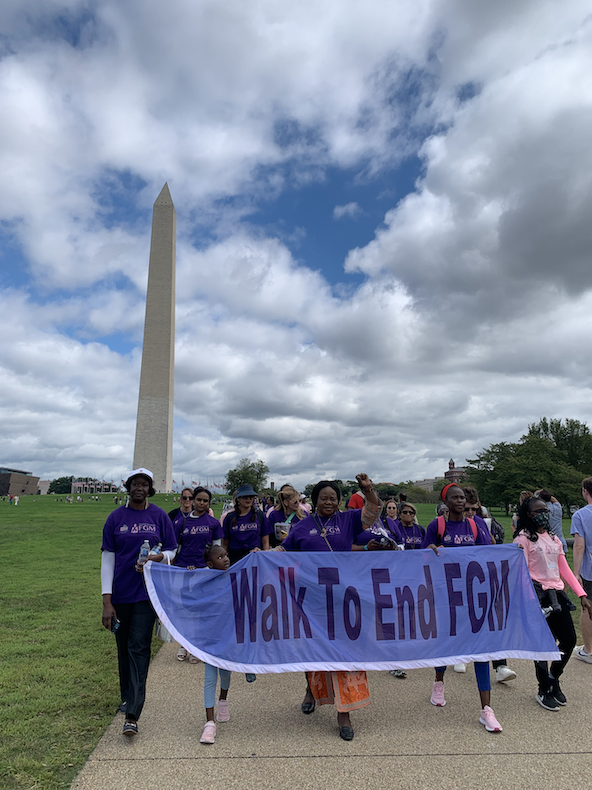
By Rachel Wine On September 30th, I had the honor of joining survivors, activists, and allies from around the world to participate in the 9th Annual Global Woman Awards the 10th Annual Walk to End FGM. I was grateful for the opportunity to meet with my peers in the anti-FGM/C field in-person, and share in the collective energy that is fueling the work to end this harmful practice. The ceremony kicked off with a musical performance, a keynote speaker, and opening remarks by the Global Woman P.E.A.C.E Foundation’s founder, Angela Peabody. The award ceremony began with the category of legal and policy work in the anti-FGM/C field; this year’s awardee was our very own Mariya Taher! Though Mariya was unable to attend the event in-person, I was excited to celebrate the recognition of her hard work and share some remarks on her behalf. I was eager to tell the crowd about Sahiyo’s work as Coalition members in Massachusetts, Washington, and Connecticut, and the successes of passing legislation in the former two states. I explained that passing legislation is only half the battle, and the other half is holding legislators accountable for upholding the law. I also emphasized the importance of holistic approaches to ending FGM/C, such as educational initiatives and programs for survivors. After accepting the award on Mariya’s behalf, I was delighted to hear about the accomplishments of the other awardees, including an educator, doctors, survivors, students, and more. I felt hopeful for the future of this work seeing many young activists in the crowd. When the award ceremony ended, the group gathered to walk from the Washington Monument to the Lincoln Memorial and back, united in chanting “No More FGM!” Many patrons of the National Mall stopped us to ask what FGM stood for; we shared pamphlets and information to educate them, and hopefully fueled their curiosity to learn more. As we sat on the steps of the Lincoln Memorial chanting, clapping, stomping, and cheering, I was reminded of the power of being a part of something bigger than myself. This event was something I won’t soon forget, and I’ll look forward to many future celebrations of our work to end FGM/C.
Washington State becomes 41st state to pass law against FGM/C
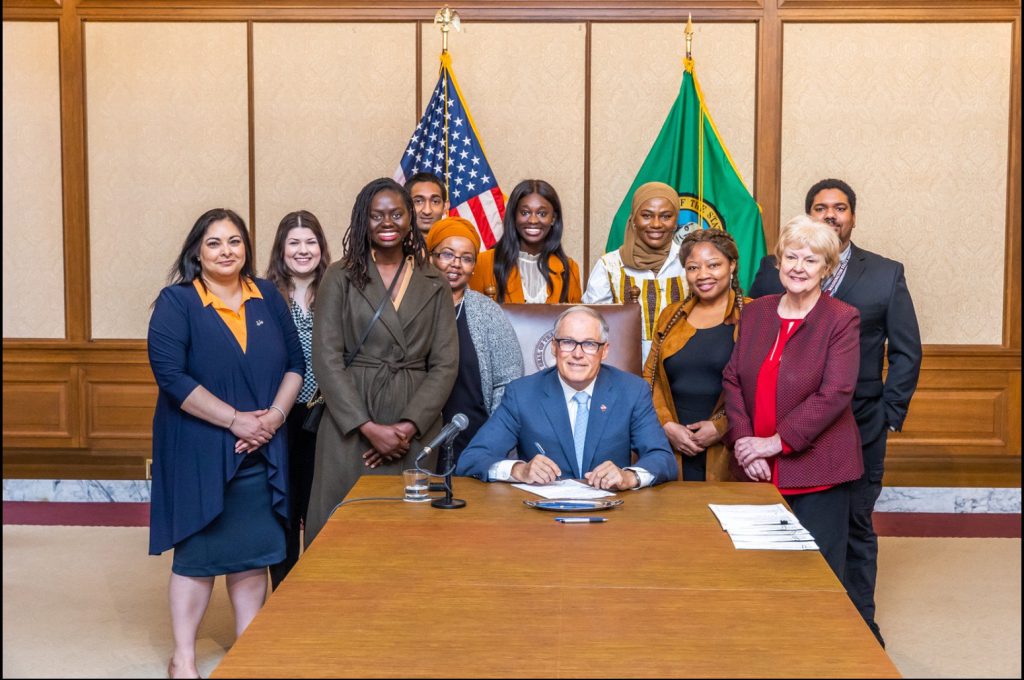
Sahiyo, as part of the Washington Coalition to End FGM/C, is ecstatic to announce that on April 20th, 2023, Washington state Governor Jay Inslee signed Senate Bill 5453 concerning female genital mutilation/cutting (FGM/C) into law. This law creates a private right of action for survivors of FGM/C; prohibits providers from performing FGM/C on a minor; establishes education and outreach initiatives to prevent FGM/C; and provides care for victims and families of FGM/C. Many thanks and congratulations to all who were involved in this legislative process! Below are reactions to the bill’s passage by members of Washington Coalition to End FGM/C. This survivor- and community-led coalition was instrumental in advocating for and gathering support to make this law a reality. “SB 5354 passing is a victory and an emotional moment on so many levels. The power of the collective work and collaboration of the coalition members and affected communities is a living example of the power of community engagement/involvement. The representation and story shared is so real and compelling. The coalition work is not yet over, the coalition work model should be replicated to propose similar bills in the remaining nine states. More importantly, the bulk of the work starts after SB 5354 was signed by the Governor. The goal is to make sure appropriate pathways, educational programs, and materials developed to meet these communities’ needs are culturally sensitive and will maintain families well beings, as well as promote healing; and the community should have access (parents, children, and professionals). I am so proud to be a part of this great coalition.” ~Dr. Muna Osman “Passing this bill is long overdue, and I feel proud to see Washington state join the 40 other states that have acted to end this practice. The collaborative work of our coalition that led to the passing of SB 5453 in Washington can serve as a model for the 9 other states that have yet to act against female genital cutting. This law presents an opportunity for a much-needed conversation and education on FGC in our communities and is a critical step towards advancing gender equity and human rights while safeguarding future generations of girls and women from this harmful practice.” ~Absa Samba “It’s absolutely amazing to see that Washington has become the 41st state to pass a law to protect children from female genital mutilation/cutting. Over the past 10 years, I’ve been fortunate to be part of survivor-led coalitions in Massachusetts and Connecticut that have sought to create change when it comes to ending this harmful practice. I am amazed by just how quickly we were able to form a survivor-led coalition in Washington, and I am forever grateful that our bill sponsor, Senator Keiser understood the importance of ensuring that the language of this bill was based on feedback from FGC-impacted communities themselves.” ~Mariya Taher, Executive Director, Sahiyo U.S. “The only way the United States can effectively advance gender equality is if we lead by example. And that starts, here at home. Five years ago, I started a petition to push Washington state to ban FGM, mobilizing over 170,000 supporters along the way. I’m grateful for Absa Samba, a bright light and young leader who convened survivors from diverse backgrounds, to craft legislation that balances prosecution and prevention in a way that can serve as a model for not just Washington state, but the world. The passing of this bill illustrates how survivor-fueled advocacy can lead to sustainable social change.” ~Maryum Saifee “I joined Absa Samba as she created a coalition of diverse Washington State women who live in communities affected by FGM, were bravely willing to share their personal experience with FGM, and share a commitment to curbing this practice through the passage of SB 5453. As a professor of anthropology with decades of experience studying strategies to end FGM, I offered testimony on the proven importance of legislation as a tool for change, particularly when it funds outreach and education. When families and community members deliberate upon whether a girls should undergo FGM, knowledge of the law strengthens the power of persuasion of those who no longer endorse the practice. As such, the law will strengthen efforts to prevent girls in Washington State from being subjected to the practice of FGM.” ~Bettina Shell-Duncan “The U.S. End FGM/C Network is thrilled to see the passing of SB5453, making Washington State the 41st state in the U.S. to take a stand against FGM/C. This new law sets a precedent for the remaining 9 states to pass comprehensive, holistic laws to protect women and children across this country. We also know that this is only the first step and we look forward to working with the WA Department of Health, the WA Coalition to End FGM/C, impacted communities, and other stakeholders to ensure that this law is implemented to its fullest potential.” ~Caitlin LeMay, Executive Director, The U.S. End FGM/C Network “Children’s Alliance is honored to have had the opportunity to work alongside an incredible team of FGM/C survivors and advocates to pass this critically important legislation. Washington state was a laggard in providing protections against this practice; our state’s children and youth will greatly benefit from the work of this coalition.” ~Dr. Stephan Blanford, Executive Director, Children’s Alliance “It saddens me that it is 2023, and young girls are still at risk of facing FGM/C or have already experienced such a traumatic incident. It is heartbreaking and needs to come to an end. This bill is one step closer to making young girls feel safe in Washington. This bill is hope, hope that young girls in Washington will not experience such a violent act. Now, it’s time to work on an effective implementation that will change their lives.” ~Mother Africa “We applaud Washington lawmakers for taking this critical step in the fight to eradicate the practice of FGM in the United States, and call on the remaining nine states to take similar action. FGM is
Washington State makes progress to end FGM/C
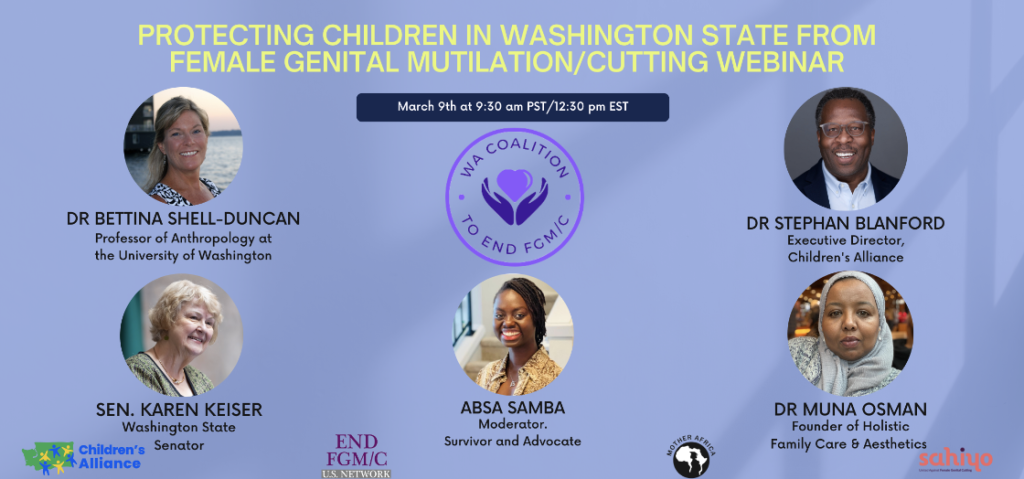
Washington State is one of the remaining ten U.S. states without any law that addresses and prohibits female genial mutilation/cutting (FGM/C). FGM/C is a human rights violation and form of child abuse and gender-based violence that involves removal of the female genitalia for non-medical purposes. This gap in state protection has left children in Washington vulnerable to this harmful practice. In fact, an estimated 25,000 women and girls in Washington are living with or at risk of undergoing FGM/C. The Seattle-Tacoma-Bellevue metro area is considered the 5th highest metro area in the U.S. in terms of the size of the FGM/C-affected community. In 2019, a change.org petition that gained 170,000+ signatures was started to address this lack of protection for children. “Washington state is #18 for gender equality by US News and World Report. Gender Equality should be a priority in Washington state. Social, political, and economic equality and equity is limited when we don’t have the full participation of all of our women and girls. Harmful customs or social norms that contribute to GBV (gender-based violence) including FGM/C in addition to costing lifelong pain and suffering can hold women, girls, and others who have undergone FGM/C back from full participation.” ~ Absa Samba The Washington Coalition to End FGM/C was created to educate people in the state about the need for policy solutions to address FGM/C. The coalition is made up of survivors, community organizations, legislators, advocates, and others. On March 9th the Washington Coalition to End FGM/C held a webinar in partnership with Sahiyo, The U.S. End FGM/C Network, Children’s Alliance, and Mother Africa to help shed light on how FGM/C impacts those living in Washington state, and to discuss policy level solutions, community-based programs, and education initiatives needed to protect women, girls, and others from undergoing this harmful practice. Speakers included: Absa Samba, a student, activist, and survivor of FGM/C who helped found the Coalition and made contact with Washington Senators to sponsor a bill against FGM/C, Bettina Shell Duncan, a Professor of Anthropology at the University of Washington in Seattle who has done extensive research on FGM/C, Stephan Blanford, the Executive Director of Children’s Alliance, Muna Osman, Doctorate Prepared Nurse Practitioner, founder of holistic family care clinic, a co-founder of mama amaan research team, and survivor, Senator Karen Keiser (D-WA 33), sponsor of SB 5453, a bill that will make FGM/C illegal in Washington State. Speakers helped to shed light on the issue of FGM/C by discussing what it was, who it impacts, and most importantly, that it does affect residents of Washington. The vital need for policy to end FGM/C amongst future generations of children was also discussed. “The pressure to undergo FGM can be intense for girls and their families…the solution is to coordinate change in families and communities so that people are not acting in isolation. If everybody can agree to abandon the practice, the negative sanctions can be lifted…When other members of the community are given the power of law to strengthen their position, the law becomes a powerful tool for enhancing their power to persuade others that this is a practice that’s no longer relevant in this context and in this time.” ~ Bettina Shell Duncan, panelist The coalition has supported policy work by working on the passage of Washington Senate Bill 5453. This bill, informed by the Washington Coalition to End FGM/C, has been championed by state Senator Karen Keiser and, if passed, will prohibit FGM/C on minors, creates a civil cause of action for survivors of FGM/C, and establishes an education program to prevent FGM/C in Washington. “This education component of this bill is huge for our [Somali] community. I think this bill coming from us, for us, by us, to help the community, I think it is a beautiful thing. I am confident that the community will accept it.” ~ Muna Osman, panelist During the event, audience members were also called to action to support the bill by signing onto an action alert. As of March 29, Senate Bill 5453 has passed the Washington state Senate unanimously and is making its way through the House of Representatives. Similar legislation was introduced in the Washington legislature in 2019 but it did not pass; a key difference between the two campaigns is that this year in 2023, the bill is backed by a strong coalition of directly-impacted survivors, advocates, community members, health practitioners, human rights activists, policymakers, faith based groups, and other allies. Whereas in 2019, there was a lack of inclusion of FGC impacted communities who lived in Washington in the crafting of the legislation. The unanimous support from legislators this year is a strong indication that Washington state will become the 41st state to pass a law to prohibit and prevent FGM/C.
Washington Senate Bill 5453 moves to House Appropriations Committee

In Washington state, Senate Billl 5453 concerning female genital mutilation/cutting (FGM/C) recently passed the House Committee unanimously, and is now scheduled for a public hearing with the House Appropriations Committee on Friday, March 31st at 1:30 PM PST. The bill, which was introduced on January 18th, aims to: create a private right of action for survivors of FGM/C; prohibit providers from performing FGM/C on a minor; establish education and outreach initiatives to prevent FGM/C; provide care for victims and families of FGM/C. You can show your support for this bill in one of the ways below: Testify In-Person (oral testimony limited to only 1-2 minutes max) Testify Remotely (oral testimony limited to only 1-2 minutes max) Submit Written Testimony Vote Pro Learn more about Washington SB 5453 from the Washington Coalition.
Washington Coalition hosts educational webinar on female genital cutting

On March 9th, the Washington Coalition to End FGM/C, in partnership with Sahiyo, The U.S. End FGM/C Network, Children’s Alliance, and Mother Africa, held a webinar called Protecting Children in Washington State from Female Genital Mutilation/Cutting with the goal of drawing attention to this human rights violation and how it impacts children in the State. The webinar was also held to highlight the need for Senate Bill 5453, which would make female genital cutting (FGC) illegal in the state, provide civil remedies for survivors, and call on education programs on FGC to be created. A 2016 study by the Population Reference Bureau estimated that 25,000 girls and women in Washington State are living with or at risk of undergoing FGC. The study also ranked the Seattle-Tacoma-Bellevue metro area as the 5th highest metro area in terms of size of the FGC-affected community in the U.S. The webinar hosted a panel discussion in which speakers Absa Samba and Muna Osman shared their personal experiences with FGC as survivors and activists working to end the practice. Researcher Bettina Shell-Duncan discussed how research supports the need for legislation to change social norms around communities believing that FGC had to continue for the good of the child. Finally, Stephan Blanford, Executive Director of the Children’s Alliance highlighted how the state has seen other sharmful ocial norms regarding children change through policy in the state and how he is confident the same could be said if a law on FGC were created. Watch the recording of the webinar here: [youtube url=”https://www.youtube.com/watch?v=pZEefGBUTzQ”]
Washington SB 5453 moves to the House

SB5453 in Washington State is onto a hearing in the State’s House for Monday, March 13th after passing the Senate unanimously. To express your support of SB5453: You can vote PRO by clicking this link. This is the quickest and easiest way to express your support of this bill! For WA based members, click here to testify In-person If you would like to testify virtually, please schedule your testimony here Lastly, you can submit written testimony Statement from the Washington Coalition: We are a newly formed Coalition working to end the practice of female genital mutilation/cutting (FGM/C) in the State of Washington. We comprise a broad group of survivors, stakeholders and advocates. Forty US States have laws banning the practice of FGM/C. Washington has yet to address this important human rights issue in any manner. This proposed legislation SB 5453 under review today is a good first step towards ending the practice and supporting survivors in Washington State. Review the Washington Coalition’s factsheet to learn more about this bill and its significance.
A conversation with Washington activist Absa Samba: SB 5453 a product of collaboration and persistence

By Rachel Wine As the Washington Senate Bill 5453 concerning female genital mutilation/cutting (FGM/C) moves forward in the legislature, I had the honor of speaking with Absa Samba, who has been instrumental in advocating for legislation on FGM/C in Washington state. Absa’s advocacy journey began over a decade ago, when Absa was in middle school. She attended a training, which explored gender issues, and it immediately became clear that things like gender expectations, gender roles, and harmful cultural practices were connected. “I think the training… became a validation for what I’ve always felt, this inequality that existed in my society, and… I had language for what was going on, and that’s when I started getting involved in advocacy and activism for the rights of women. A big part of that became advocating against harmful cultural practices, like child marriages and female genital cutting.” Washington, where she currently lives, is one of ten remaining states without a law against FGM/C, though it is one of the highest-risk states; a 2016 study found that the Seattle-Tacoma-Bellevue metro area was the 5th highest metro area in the U.S. in terms of the size of the FGM/C-affected community. Absa’s background as an activist, and personal connection to this issue and other harmful cultural practices (she is a survivor of FGM/C), inspired her to choose FGM/C as her focus for a policy analysis class assignment. “I was just doing an assignment, and I found out through my research that there were two bills that were presented that never made it out of Committee. And I think when I noted that in my paper, my professor asked me to find out why those bills failed, and that’s when I reached out to one of the Senator’s office who had sponsored the bill in the Senate.” What began as a class assignment evolved into an opportunity for Absa to chat Senator Karen Keiser on FGM/C in May of 2022. “The Senator herself met with me and wanted to chat about the bill, the issue. And out of that conversation, I was like, okay, maybe a presentation on what FGM is would be helpful for this person, they seem really interested in it. So I opted to do a presentation, and the Senator was gracious enough to take the offer and invited other chairs of different Committees in the Senate to come to that, and it was at that point that I realized I was taking on more than I could afford to at the time. So I was connected with Mariya [Taher] and I reached out to Bettina [Shell-Duncan] and other folks and I said, “Hey, this is an opportunity to talk to these people about FGM in Washington, would you be interested in joining?” And they were kind enough to come on and help me with that presentation, and I think it was that moment that we realized, actually, this is really an opportunity to do something about this issue in Washington State.” By pulling together support from the FGM/C sphere, Absa unknowingly planted the seed for the group that would become a key stakeholder in SB 5453’s creation. Senator Keiser recognized the opportunity to do something from this initial experience; “her desire to introduce a bill on FGM/C solidified this work.” Absa began to facilitate the group working with Senator Kaiser, who was determined to loop in advocates and survivors in creating the bill. Absa would organize meetings and generate statements for the group, which eventually became the Washington Coalition Against FGM/C. The Coalition and various other stakeholders worked closely to co-author the bill, and Absa is rightfully proud of that. “We’ve worked with the Senator closely to create the bill, I think what was remarkable was how much time Senator Keiser invested in making sure the bill was the way it should be, that it speaks to the realities of communities that are affected by the issue. That it was done in collaboration with stakeholders in this issue, we [the Washington Coalition] have worked with her in the process of creating a bill to give feedback and input on what we think should be in the bill, and what shouldn’t. And working to find a common ground, so that we could work collectively. I think that can be seen in how well the bill was done and how well it’s progressing in the legislature at this time.” As SB 5453 moves to the House after passing in the Senate on March 1st, the Coalition continues to lead the drive for change. Though Absa’s goal was never to form this Coalition or even do this legislative advocacy, she has found herself here by believing in this work. The support of her fellow Coalition members, many of whom are also survivors that care deeply about this work, has also been critical; Absa has learned that “little steps and persistence will inspire others to power it along.” When considering their success, she emphasizes the importance of varied backgrounds and expertise that Coalition members bring to the table, which got things going in the right direction. “Building a team and getting various stakeholders involved in making change happen is significant. Collective voice has the power.” When asked for any advice she may have for other advocates, or anyone hoping to take a stand for something important to them, Absa had this to say: “Do something. Not doing anything is not an option. The little wins matter, and what makes the goal achievable is not entirely dependent on one individual, it takes a collective. The more you keep going, the more people buy into your goal, the closer you get to achieving the goal.” In the case of Washington, this certainly rings true. Absa Samba is a graduate student pursuing a double masters in Social Work and Public Administration at the University of Washington’s Evans School of Public Policy and Governance and the School of Social Work. She is a survivor of FGC and a passionate advocate for
Proposed legislation in Idaho and Texas discriminates against Transgender Youth and removes protections for children at risk of undergoing FGC
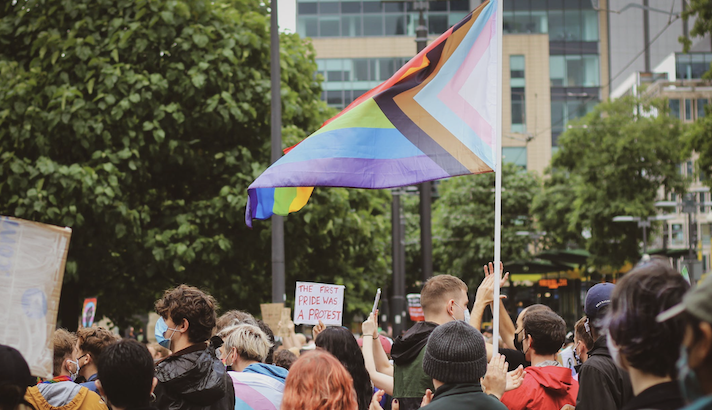
By Hunter Kessous Texas and Idaho are two states in which female genital cutting (FGC) is illegal under state law, for now. In both states, amendments have been proposed in the state legislature that would alter existing policy against FGC to ban gender-affirming care for minors. Gender-affirming care includes social, psychological, behavioral, and medical practices which affirm the gender identity for individuals whose gender does not match the one they were assigned at birth. These amendments are dangerous for transgender youth as well as children who are at risk for or have undergone FGC. These legislative revisions attempt to conflate FGC and gender-affirming treatments, so it is critical to understand the difference between the two. Gender-affirming care, including social interventions, pubertal suppression, hormone therapy, and gender-affirming surgeries, has been shown to decrease rates of depression, improve psychosocial functioning, and have minimal long-term side effects for transgender individuals. Gender-Affirming Care Female Genital Cutting Definition Social interventions, pubertal suppression, hormone therapy, and gender-affirming surgeries which affirm the gender identity of individuals whose gender does not match the one they were assigned at birth. The practice of partial or total removal of the external female genitalia, or other injury to the female genital organs for non-medical reasons. Temporality Health professionals consider pubertal suppression and hormone therapy to be reversible. Gender surgery is permanent, but research has shown that regrets about having this procedure are very rare. FGC causes irreversible, lifelong physical and psychological harms. Mental Health Outcomes Gender-affirming care leads to decreased rates of depression, improvement in psychosocial functioning, and minimal long-term side effects. FGC often leads to harmful psychological outcomes, including PTSD, anxiety, and depression. Bodily Autonomy Medical care for transgender people is their choice as part of their right to bodily autonomy. Minors are often forced to undergo FGC. Consent to undergo FGC cannot be freely given due to societal pressure. To learn more about the differences between gender-affirming treatments and FGC, read here. According to Equality Texas, 76 anti-LGBTQ+ bills were filed in the last legislative session and special sessions in Texas, of which only 20 moved forward and one passed. These legislative failures have led Texas lawmakers to take up a more creative and dangerous approach to get what they want. Bill SB249 amends the state’s Health and Safety code, which has made FGC illegal in Texas since 2017. This legislation is concerning because “Female Genital Mutilation” would be entirely removed from the law, leaving only the term “Genital Mutilation.” Failing to specifically prohibit FGC weakens protections for children who are at risk of undergoing the practice. The amendment adds a list of surgeries that would be prohibited, some of which fall under the WHO classification of FGC, while others are gender-affirming surgeries – thereby wrongfully conflating the two. In addition to removing access to life-saving care for transgender youth, this section is troubling because FGC is not always performed as a surgery. Rather, FGC is often done outside of a medical setting. Bill SB249 puts children at risk of undergoing FGC into a more vulnerable position. Unfortunately, Texas’s state legislature is not alone in pursuing this dangerous action. In Idaho, HB71 has already passed the house and will now be reviewed by state senators. Once again, the term “Female Genital Mutilation” is erased from the law. The language is amended to only refer to practices performed by medical practitioners. However, we know FGC often operates outside of the healthcare system entirely, so this amendment could limit avenues of prosecution against FGC practices. Furthermore, the maximum sentence for breaking the law against FGC is currently life, but this amendment would change the maximum sentence to 10 years, further removing protections for children at risk of undergoing FGC. Where the Texas bill bans gender-affirming surgeries, the Idaho bill goes a step further. Even puberty-blocking medication and hormone therapy would be banned under Idaho’s amendment. Pubertal suppression is a method of delaying puberty, and hormonal therapy causes secondary sex characteristic development that aligns with one’s gender. Both are reversible and associated with better mental health outcomes for transgender youth. Banning these life-saving treatments has no basis in the movement to end FGC. If you are an Idaho or Texas resident, please consider contacting your state legislators to let them know you do not support these bills.
Troubling Idaho House Bill 71 moves on to Senate
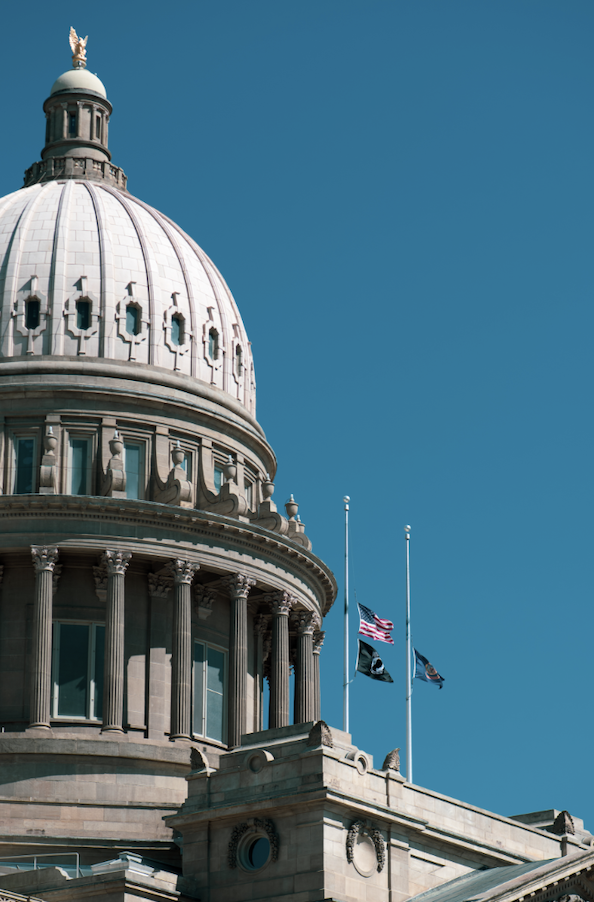
In 2019, the Idaho Legislature established a law protecting girls from female genital mutilation/cutting (FGM/C), recognizing it as a violation of human rights. Yet, for the past two years, the same Idaho Legislature has targeted Trans youth, another vulnerable community, by attempting to amend the existing FGM/C law. This amendment would prohibit gender-affirming healthcare from being performed on children, even if they have parental consent. In 2022, Rep. Bruce Skaung introduced HB 675, which would prohibit surgery “if it is for the sole purpose of attempting to change or affirm the child’s perception of the child’s sex if that perception is inconsistent with the child’s biological sex.” The bill passed the House but was rejected by the Senate, as it was viewed to be an infringement on parental rights. However, as of February 15th, another attempt is being made to take away medical care for Trans youth through HB 71. This bill has passed the House and is on to the Senate for a vote. This Bill is problematic for many reasons; particularly the false assumption that gender-affirming care and FGM/C are comparable. They are not. This Bill puts Trans youth and children at risk of FGM/C, both vulnerable groups, in greater danger. Diluting the current statue, Idaho Code 18-1506B, with attempts to discriminate against Trans youth will ultimately hurt more children and inhibit progress in ending FGM/C in Idaho. Learn more about this Bill by reading this Statement from the US End FGM Network.
